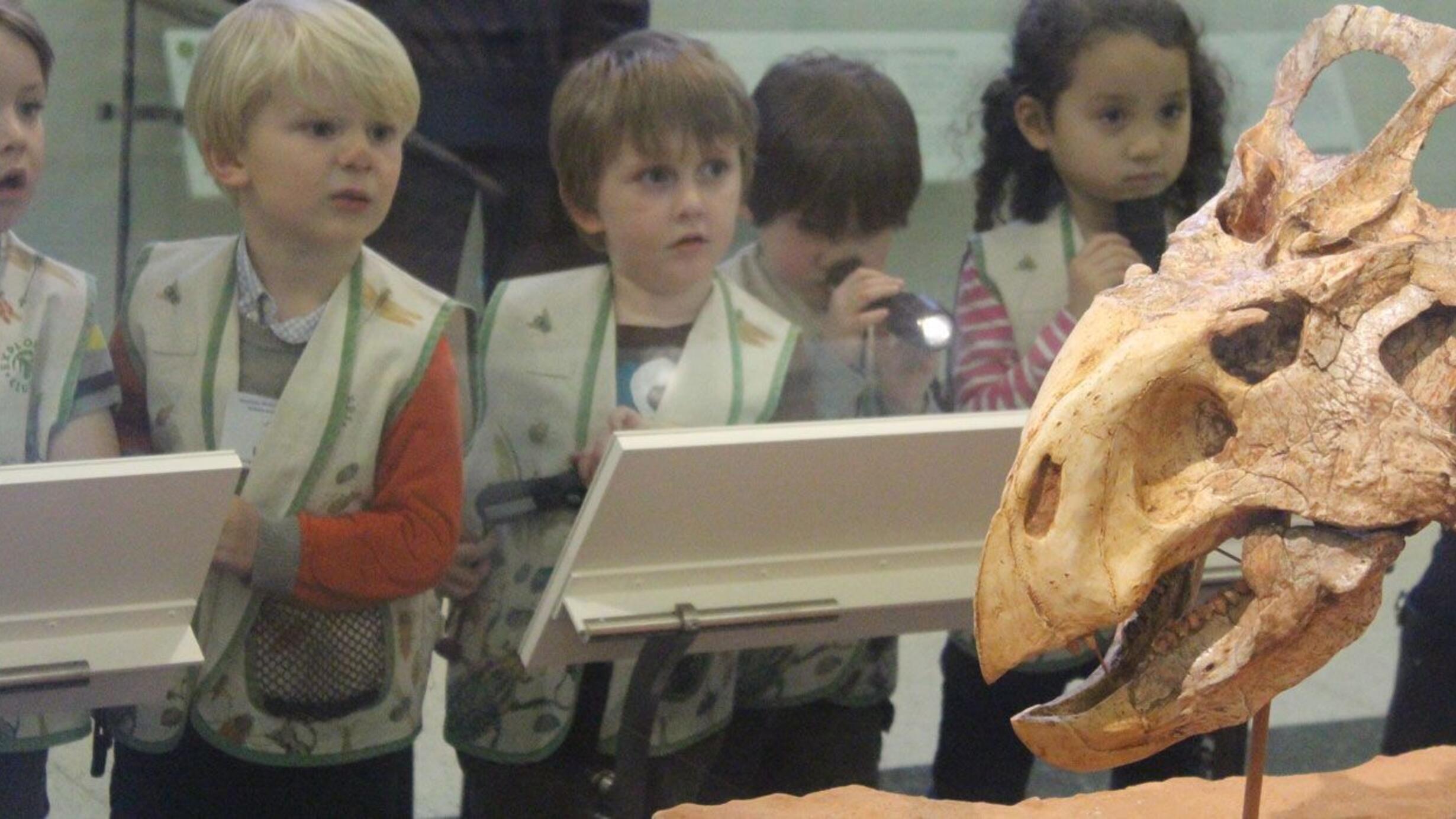The Science and Nature Program
Part of Children & Families
2024-2025 Classes
Class:
Young Scientists | Kindergarten
What’s special about the seasons? The first year of the Science and Nature Program is dedicated to the cycles of the year as we examine how creatures of the Northeast survive and thrive through the seasons. Peek inside an acorn home, wonder at the winter woods, and spot signs of spring as you and your child go on “expeditions” to different Museum dioramas, collaborate on science crafts, and investigate your own local habitat!
Cost: $4,100
Age Group:
Kindergarten
Dates & Times:
Mondays or Tuesdays.
3:30–5 pm
Kindergarten
Mondays or Tuesdays
3:30–5 pm
Class:
Young Scientists | 1st Grade
What can we learn from 34 million things? Study geology, marine biology, cultural anthropology, and archaeology to find out how the Museum uses its vast collection to answer questions about the natural world. Share your own collection with classmates, go behind the scenes to see a Museum collection, meet people who do science, and make your own observations of Museum specimens to gain insight into the wonderful world of science at the Museum.
Cost: $3,950
Age Group:
Grade 1
Dates & Times:
Thursdays or Fridays.
3:30–5 pm
Grade 1
Thursdays or Fridays
3:30–5 pm
Class:
Young Scientists | 2nd Grade
What do paleontological pick axes and space telescopes have in common? Find out as you work to solve problems and ask questions that paleontologists and astrophysicists face in the real world! Use scientific tools, make models, and hear from people doing science at the Museum. Whether it is the vast scale of geologic time or the massive size and scale of the universe, the 2nd grade students investigate big questions about our planet’s past and the worlds beyond.
Cost: $3,950
Age Group:
Grade 2
Dates & Times:
Wednesdays.
3:30–5 pm
Grade 2
Wednesdays
3:30–5 pm
Class:
Fellowship of the Young Scientist | 3rd Grade
From the deepest ocean trench to the highest mountain peak, our ever-changing planet supports a wide-variety of life. Explore the systems of our dynamic Earth and it’s many different biomes while learning about how living organisms have adapted to thrive in the most unlikely habitats. Visit Museum halls, play games, and create projects, all while discovering the intricate relationships between life and our planet.
Cost: $3,950
Age Group:
Grade 3
Dates & Times:
Tuesdays or Thursdays.
3:30–5 pm
Grade 3
Tuesdays or Thursdays
3:30–5 pm
Class:
Fellowship of the Young Scientist | 4th Grade
What makes ecosystems on our planet healthy and why are healthy ecosystems important? Investigate environmental issues such as invasive species, pollution, habitat degradation, and climate change on both a local and global scale all while playing games, making models, and visiting Museum halls. Discover the ways that people can work to overcome these issues using science research, participating in community science, and taking action in their daily lives!
Cost: $3,950
Age Group:
Grade 4
Dates & Times:
Tuesdays or Thursdays.
3:30–5 pm
Grade 4
Tuesdays or Thursdays
3:30–5 pm
Class:
Museum Investigations in Science | 5th Grade
If you built your own museum exhibition, what would the topic be? How would you choose to communicate that information? In the final year of the Science and Nature Program, explore not only different areas of Museum research, but also how Museum displays engage and share information with visitors. Connect with your classmates through culture and investigate the evolutionary story that led to the diversity of species we have on our planet today. Hear from Museum professionals, visit Museum lab spaces, and create your own Museum display
Cost: $3,950
Age Group:
Grade 5
Dates & Times:
Mondays.
3:45pm -5:15pm
Grade 5
Mondays
3:45pm -5:15pm
Children and Family Learning at the American Museum of Natural History provides exciting science learning opportunities for young children and families through OLogy, the Discovery Room, The Science and Nature Program, and Public Programs.
Support for Children and Family Learning programming has been provided by Shaiza Rizavi and Jonathan Friedland, the Filomen M. D’Agostino Foundation, and Ellen K. and Lawrence R. Gross.
